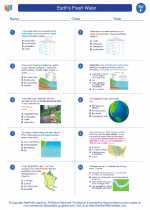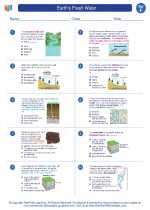Earth's Fresh Water
Fresh water is a limited resource on Earth. It is essential for all living organisms and is found in various forms such as rivers, lakes, and groundwater. Understanding the distribution and importance of fresh water is crucial for environmental sustainability and human well-being.
Distribution of Fresh Water
The majority of the Earth's fresh water is stored in glaciers and ice caps, accounting for about 68.7% of the total fresh water. Groundwater holds approximately 30.1%, while surface water in lakes, rivers, and swamps only makes up 0.3% of the fresh water on Earth.
Importance of Fresh Water
Fresh water is vital for various purposes, including drinking, agriculture, and industrial activities. It also supports aquatic ecosystems and helps in regulating the Earth's climate. However, factors such as pollution, over-extraction, and climate change pose significant threats to the availability and quality of fresh water.
Study Guide
- What are the main forms of fresh water on Earth?
- What percentage of fresh water is stored in glaciers and ice caps?
- Why is fresh water important for human activities and ecosystems?
- What are the major threats to the availability and quality of fresh water?
- Discuss the role of fresh water in regulating the Earth's climate.
Understanding the distribution, importance, and challenges related to Earth's fresh water is crucial for sustainable water management and conservation efforts.
.◂Science Worksheets and Study Guides Sixth Grade. Earth's Fresh Water

 Worksheet/Answer key
Worksheet/Answer key
 Worksheet/Answer key
Worksheet/Answer key
 Worksheet/Answer key
Worksheet/Answer key
 Vocabulary/Answer key
Vocabulary/Answer key
 Vocabulary/Answer key
Vocabulary/Answer key
